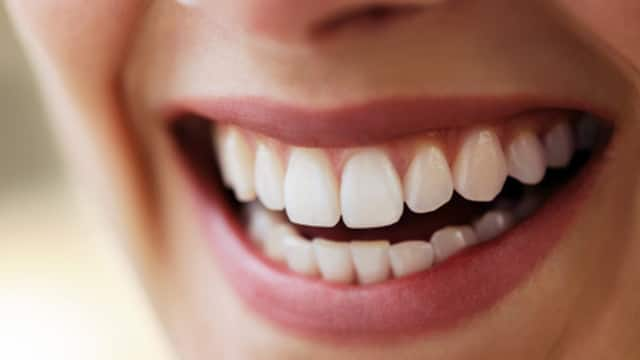The carbamide conundrum
Tooth whitening can involve bleaching gels; a bleaching agent, generally carbamide peroxide or hydrogen peroxide (yep, the same thing used to brighten hair), is used to whiten the shade of your teeth.
You can also brighten your smile without bleaching. The abrasive action of brushing and professional cleaning can help remove surface stains. Whitening toothpastes with chemical or polishing agents can also help with discoloration.
If you already have sensitive teeth, which means you have exposed dentin, then the thought of using high-concentration peroxide gels or brushing with abrasive chemical agents probably sounds unpleasant. The American Dental Association lists tooth sensitivity and gum irritation as possible side effects of peroxide-containing bleaching products.
Say goodbye to tooth stains and hi to a brighter smile with our whitening toothpaste range!
Buffering the bleach
But like your smartphone, teeth technology is getting smarter by the day. The bleaching gels used nowadays are well buffered, so sensitivity is not a major problem. Just make sure you use dentist-recommended products.
Simply keeping up your oral hygiene habits with daily brushing and flossing and regular dental visits can also promote a whiter smile.
Like so much in life, small steps lead to big results. Next, let’s step into a dentist’s office.
Go to the pros
No prizes for guessing who should be your co-partner in a whitening venture. Your dentist is an integral part of your teeth whitening decisions, whether you have sensitive teeth or not. The American Dental Association recommends choosing a bleaching product only after consulting with your dentist.
He can examine your mouth and determine which whitening options are right for you, whether it is in-office or at-home bleaching product or a whitening toothpaste. Even without a bleaching procedure, your dentist or dental hygienist can clean your teeth to remove external stains.
Your dentist may suggest using a fluoride rinse, gel or strong fluoride toothpaste to strengthen your teeth. There are also in-office treatments to help with sensitivity, such as fluoride varnishes or plastic resins.
A bright future
We’ll end with a double hit of good news. You don't have to settle with those yellow stains just because you have sensitive teeth. In fact, with the guidance of your dentist, you can make your teeth not only brighter, but stronger!
Original content by Brenna Stone
This article is intended to promote understanding of and knowledge about general oral health topics. It is not intended to be a substitute for professional advice, diagnosis or treatment. Always seek the advice of your dentist or other qualified healthcare provider with any questions you may have regarding a medical condition or treatment.
ORAL HEALTH QUIZ
What's behind your smile?
Take our Oral Health assessment to get the most from your oral care routine
ORAL HEALTH QUIZ
What's behind your smile?
Take our Oral Health assessment to get the most from your oral care routine












